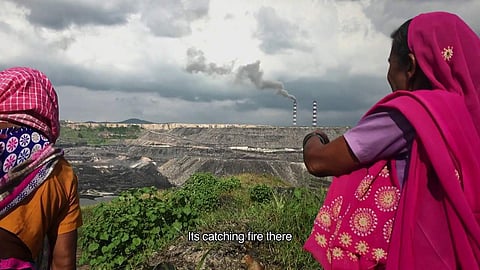

Today, we so often see governments and private companies exploiting our villages and the natural resources available there. They care less about the impact their actions will have on the villagers or the ecology and more about their business. One such story is the illegal mining in Rajgarh, Madhya Pradesh. It has been going on for years now, leading to the worst impact on people's health. The residents of this district now fear that they will not be able to save the environment for the future generation. There's even an ongoing legal struggle to put an end to the mining. And all this has been captured by director and cinematographer Maheen Mirza in a film titled If She Built A Country.
According to Maheen, there were no plans to shoot this film. She explains how it happened, "I had been visiting Rajgarh for some time, mostly in solidarity with the struggle in this region. I would shoot when I went, hoping to contribute in some way. A case had been filed by the members of the community at the National Green Tribunal in 2014. Sometimes, I would take photographs as evidence of the environmental violations that the residents were talking about, that needed to be presented in court. The idea of making a film came when women decided to present their story from their point of view in court. With that, all the footage that had been shot before was reviewed by the women and activists working in the area. We identified the gaps and shot some more footage. Making a film is not always premeditated. Sometimes, it takes time to come to that point where a film needs to be made. This was one of those times."
Like every other filmmaker, even Maheen and her team faced a lot of challenges — time being the biggest one. She says, "The women here are always busy with agriculture, domestic work and legal cases they are fighting to save their land. There are very few moments of spare time. So, almost the entire film was shot while the women were doing some work or the other. Another big challenge was to portray the story in a way that was true to what the people wanted and how they wanted it, and not impose our ideas or views onto the film. Then, of course, there was the matter of getting stopped by private companies and even state officials from shooting at public events. The middlemen would try to spread suspicion and mistrust but the women always stood by us for protection."
Maheen, who has been working with these women closely for four years, has observed that their understanding of the land, forests, environment, community and the relationship they have with nature is very holistic and qualitative. "Often it appears raw and simple but isn't most wisdom like that? Also, their strength and resoluteness and struggle in the face of a crisis was very inspiring. We are used to seeing and hearing a certain language when issues of land and environment rights are presented — it is usually considered the domain of men. But hearing it narrated by the women was refreshingly different. Their articulation has a power of its own and I, for one, found my eyes being opened and to what is happening in our country in a very different way. Listening to these women changed my outlook on how we go about the business of development," she explains.
There are several stories in this land that have touched Maheen's heart and she feels that being cheated of their land and home is quite heart-wrenching. But the loss has not just been for the people, one of the protagonists of the film, Bhagwati Bhagat, tells us, "It has been for animals too." She narrates the story of how snakes now often enter their houses and that they have to be led out by being told that their home is in the forest. "But what can they (snakes) do?" she asks. The heat from the burning coal below and the intense heat on the surface has made them homeless.
Since the women in Rajgarh are the centre of the story, it was first screened in their village. Later, it was screened across the nation including the Open Frame Film Festival in Delhi, KPFF in Kolkata, IDSSFK in Kerala and Cinema of Resistance screened in Palampur, Himachal Pradesh. Students from different universities and colleges have also screened it including SOAS in London, Ambedkar University etc. Screenings have happened in Mumbai, Chennai and, most recently, in Bengaluru too.
